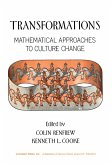This volume resists proclaiming a new social formation as so many books written by empiricists have done by extrapolating from empirical data. Until we can convincingly demonstrate that a new generative mechanism is at work, it is premature to argue what accounts for the global changes that are taking place and where they will lead. More concisely we seek to answer the question whether or not current social change can be regarded as social morphogenesis. Only then, in the next volumes will the same team of authors be able to remove the question mark.
Dieser Download kann aus rechtlichen Gründen nur mit Rechnungsadresse in A, B, BG, CY, CZ, D, DK, EW, E, FIN, F, GR, HR, H, IRL, I, LT, L, LR, M, NL, PL, P, R, S, SLO, SK ausgeliefert werden.
"Margaret Archer's contribution to critical realism has been an important part of the recent progress of the field, and her theory of morphogenesis is key to this progress. Her recent volume, Social Morphogenesis, represents a rigorous and serious step forward in the project of articulating this theory as both ameta-theory for the social sciences and a potential contribution to sociological theory." (Understanding Society, understandingsociety.blogspot.de, May, 2014)









